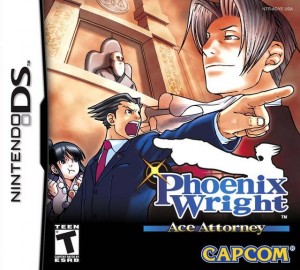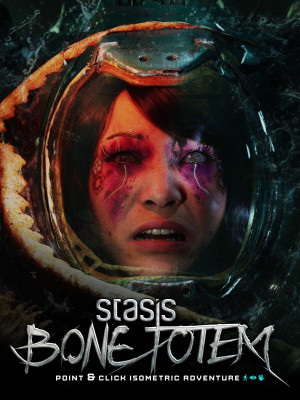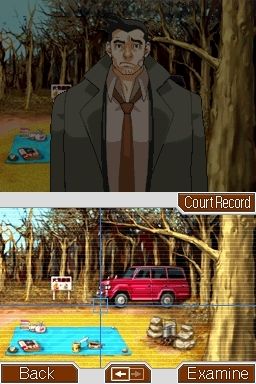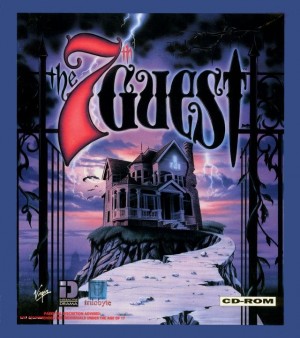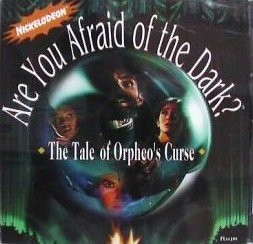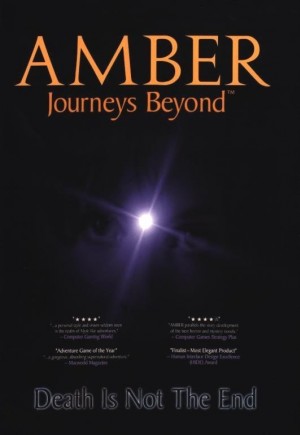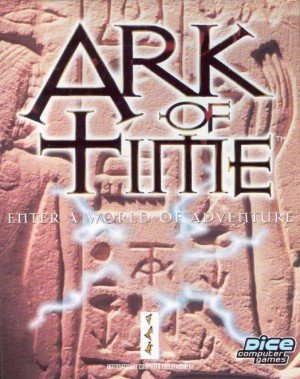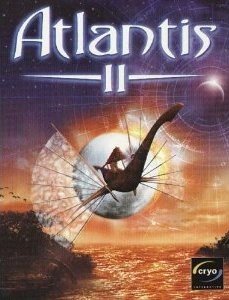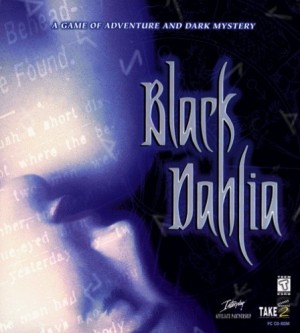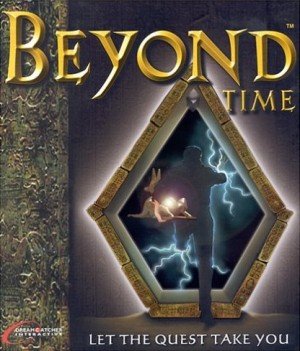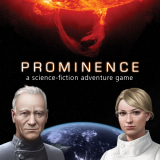Review for Phoenix Wright: Ace Attorney
Since the early '90s, virtually all conventional adventures have been point & click games on the PC. But now it's time to ditch the stereotypes, because there is a new platform in town. The Nintendo DS has unique features that bring new life to a tired genre without resorting to one pixel of action, arcade, or twitch-fingered gameplay. Phoenix Wright: Ace Attorney, based on a highly popular Japanese game series and recently released in North America for the DS, makes full use of the system's wide ranging features and functionality. The result is not only a delightful game, but hopefully just the first episode of a new adventure series.
For those still unfamiliar with the Nintendo DS, it's a handheld system featuring a dual-screened display and innovative interface with built-in gamepad controls and a stylus for touch-screen commands. Many of the in-game commands can be done with either the button functions or selecting the corresponding command with your stylus. The double screen allows for a dynamic presentation. For example, while the player interacts with various scenes, characters, or items in the bottom screen, the game's cinematics, scene changes, and other complementary visuals occur on the top screen. Even better, everything on the DS can be employed as an interactive device -- including the microphone. Phoenix takes the best of classic adventures, wraps it up in an engaging package and delivers a surprisingly rich gaming experience.
Phoenix Wright, a brand new attorney, has joined the defense firm of Mia Fey and Associates. He gets thrown into his first case and it's up close and personal, because his client is also a childhood friend who is charged with murder. Understandably edgy with so much at stake and no experience to draw upon, he comes up against his nemesis and courtroom rival, Edgeworth, a take-no-prisoners prosecutor rumored to do anything to win. Legalities, fair play, and "innocent until proven guilty" fly right out the window where this legal barracuda is concerned. As if our boy attorney didn't have enough to deal with (including constant insults about his spiky hair), there are wily witnesses, a clueless judge who is gavel-prone to deliver a guilty verdict before half the evidence is in, and a system of rules that clearly assumes witnesses never lie, they just "change" their testimony. It's a surreal world our ace attorney contends with. And the benefit to the gamer is a series of increasingly complex and involved cases or trials. To make the plot twists even less predictable, major characters reappear in subsequent cases, but in new roles and situations. Opponents and clients are seemingly interchangeable as the game advances.
Each new story starts with an apparently open and shut case. The prosecution sneeringly announces to the court that there is little point in a trial as the facts are settled. The guilty party's identity is clear (your client, of course), as are all the niggly details for a speedy guilty verdict, including means, motive, and opportunity. Fortunately for Phoenix, the truth of the situation is always open to attack, and if you win the battles of wits and wills in this bizarre courthouse universe, your clients will prevail. Through investigation, successful cross-examinations of devious witnesses, and besting assorted classic-styled puzzles, you can (and better) unravel the prosecutor's air-tight case, uncover the true villains, and get that garish "NOT GUILTY" verdict splashed across your screen while you revel in the falling confetti. Yep, getting a winning verdict in this courthouse gets a rousing response!
This suspension of reality is one factor that makes Phoenix work so well as a game. Contrary to the dry tedium of actual courtroom procedure or plodding simulation gameplay, this legal system is a combination of legal Samurais and the wild west. Attorneys have badges rather than certificates, and cross-examinations are signaled by bright red text titles and the background sound of clashing swords. It isn't Perry Mason, but it sure is engaging fun. Better yet, it is presented in a distinct graphical display.
For those familiar with classic anime like Gundam Wing or Sailor Moon, the stylized, exaggerated look of the characters and bright color palette of the backgrounds will come as no surprise, but it may catch others off guard. In Phoenix Wright, the scenes are scaled down in size to suit the limitations of a smaller screen. Environments are larger than they initially appear in many cases, however, as the arrows allow scrolling from side to side -- which is great, because each frame of this game has a wide range of interactive hotspots. Though the size of the screen does mean some loss of detail, and locating all the "clickable" items can be difficult, a small degree of pixel hunting seems reasonable in exchange for all the interactive opportunities. Subtle highlighting on interactive hotspots would have helped, and hopefully some thought is given in future episodes to eliminate even this small annoyance. But the items are worth the minor amount of hunting. Some reveal bits of characters' backstories or small plot details, while others are added to your inventory, where they will be used during trial or may be manipulated further to reveal additional clues. At no point do you feel you are in a static environment. If all PC adventure games made each frame work as hard as in this game, there would be little shelf space for all the "A" games.
Not only does the gameplay become increasingly more complex from a plot standpoint, the stories take a darker, more adult twist from time to time. And it isn't just the plot that twists. A large dose of the charm of this game comes from the characters and the dialogues. Characters from one case pop up in others in unexpected ways and new roles. Jerry Springer has nothing on this dysfunctional crew, and everyone has some personal interconnection. Figuring out all the relationships and backstories is as much fun as winning the day in court.
Characters do not run or even walk during the game. There are rudimentary facial and hand movements that occur while they are talking or testifying. Emotions are conveyed by highly exaggerated simple animations; if a character becomes distressed, worried, or fearful, tears will stream down their face in virtual rivers. If they are enraged, they momentarily morph into some demonic-looking façade. This is a bit visually extreme with a few characters. One in particular is so overblown I cringed when I realized that person was a key figure in that level. However, the dialogues turn even that eyesore into a champ. Humor is hard to nail in any medium, and this script had me laughing more times than I can remember. The script takes a poke at cultural stereotypes, movies, and even a few games along the way. Sometimes the jokes wear thin, but the campy fun is also balanced by more serious moments and observations in the game.
The gameplay in Phoenix never feels static, which is a testament to the developers taking a versatile, innovative game system and pairing it with a game carefully designed to take advantage of those features. To understand how this works together, consider the basic game features. It is really a graphical text game, with no voice work other than certain repetitive command words, background crowd noise, and other simple sound effects. There are no elaborate cinematics, and characters are largely stationary except for repetitive quirky mannerisms or exaggerated facial expressions. The display consists of near-slideshow frame-to-frame sequences, all rendered in 2D old school graphics. To top it off, a large part of the challenge is dialogue-based. And you will spend a lot of time talking to an equally large cast of characters during the game.
Much of the gameplay consists of dialogue puzzling through a series of cross-examinations of the various prosecution witnesses. These courtroom confrontations are set up as "battles" in a style common to other anime-influenced games. You don't just ask a witness for more, you press them. The payoff is a vivid red "HOLD IT!!" or "OBJECTION!" that rings out, accompanied by gasps and collective reactions around the room. Although this could get monotonous, it isn't overdone and I got a charge each time it happened. You trigger these events by touching the screen selection with your finger or stylus or pressing a button, then saying the words into your microphone. Unfortunately, the voice command seemed a bit glitchy or hard to trigger in some instances, so it worked out to be more of a novelty. Using the stylus and forward button is easier and less distracting.
Players won't feel more than illusory panic at the need to make choices, as there is no timer and you can save at any point during the game. You can push through the game or sit back and think whether you should produce that inventory item or merely question the witness more deeply at each and every turn. The questioning itself is set up quite well. Your sole goal is to trip up the witness and force them to change their testimony. Every time they do, you get a fresh shot at the witness on a new round of cross-examinations. You challenge these prosecution witnesses until you have demolished the prosecution's case. At the beginning of each case and in between courtroom battles, you investigate the crime.
The investigative portion of the game involves everything from examining locations for clues to interviewing people to making phone calls and other interactions. In the last level of the game, newly created especially for the DS (the early cases are ports of older games released in Japan), the interactive options are expanded to include creative applications of "investigative tools". One such tool is a fingerprint application. You spread the powder by touching the screen and remove the excess by blowing into the microphone. Do it just right and the revealed fingerprint locks in place and is added to your inventory. There are also a few assorted traditional standalone puzzles thrown in for good measure. Though none are designed to truly stump the player for long, they are fun and well clued. I would have preferred more puzzling like the investigative tool challenges, because a few of the more traditional puzzles involve positioning inventory items in a particular way to reveal some new clue or information vital to your case. A few are very finicky about getting the exact orientation, and it's difficult to see much difference between what seemed right but failed to work, and what finally succeeded. Not much of a quibble, but the parameters could be a bit more generous on what triggers a successful solve.
The anime look is appealing, though not everyone fancies the style. Others may think Phoenix seems dated with its lack of elaborate cinematics, mobile characters, voiceovers, and its reliance on 2D graphics. However, this game is anything but stale. If there was ever proof that what makes a game great is the sum of its parts, Phoenix Wright makes the case. By the time I worked my way through to the last successful verdict -- and this is one very long game -- the overall impression was a solidly made and engaging game in all respects, with tender moments and dark details thrown in to balance the campy aspects of the characters and cultural spoof references. If there was any doubt over whether to invest in a DS, the verdict is in: grab yourself a DS and go to court with Phoenix Wright: Ace Attorney. While games like Another Code opened the door, the strength of Phoenix Wright's debut and the prospect of further episodes in the series should seal the deal. Great adventures aren't gone, they just switched platforms.




